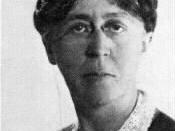IntroductionManagement has existed since early civilisation. For years, people had been searching for the best management style to run an organisation. While there may be no singling out of any best methods, Mary Parker Follett and Peter Drucker are two management gurus that were pioneers in their own right and have made significant contributions. We hence take immense pride in analysing their contributions and comparing them. While some management practices in the modern day context have to be carried out differently as compared to those proposed in the past, the result of almost all management failures and successes that we witness today rests on the understanding of many of the teachings of early management thinkers. Today's management techniques were mostly an evolution of early techniques and elements of these early teachings are prevalent in organisations today. By understanding these theories and teachings, the manager today can truly analyse and grasp the happenings around him/her which will ultimately inculcate him/her with the abilities to raise the productivity of their organisations.
Mary Parker FollettBiographyBorn in Massachusetts in 1868, Mary Parker Follett developed a keen interest in philosophy and history while studying at the Thayer Academy. She then went on to pursue the fields of psychology and political science at Radcliffe and Newnham College respectively. Her pursuit of knowledge on "the laws of association" took her to the Congress in her early twenties, Boston's escalating immigrant communities in her thirties and forties, and to the world of business and beyond in her fifties and sixties. She was highly sought after as an advisor and speaker by business leaders in her later years.
Follett's early work spanned the Progressive Era (about 1890s to 1920s), a depressing period marked by reforms in labour and fiscal policies by government. Follett's involvement with social work allowed...


